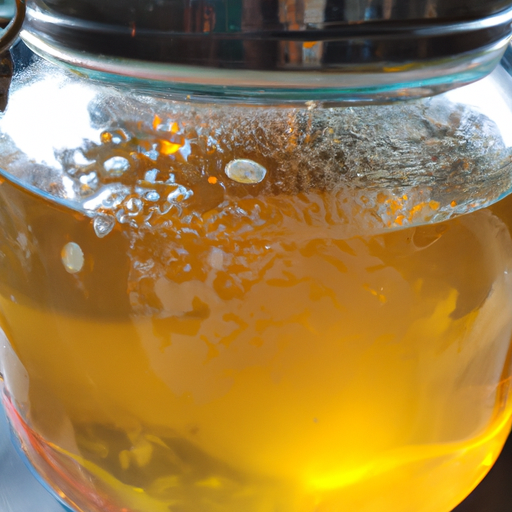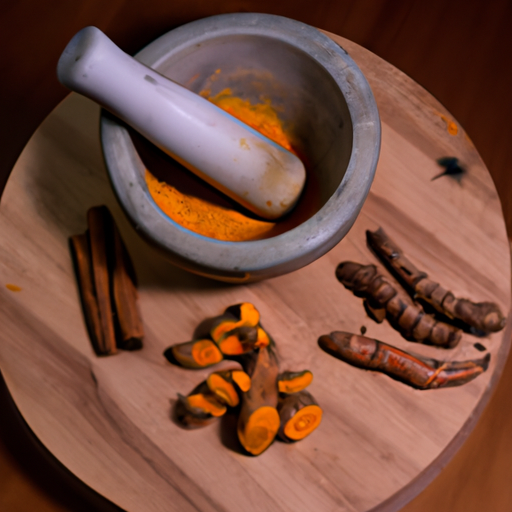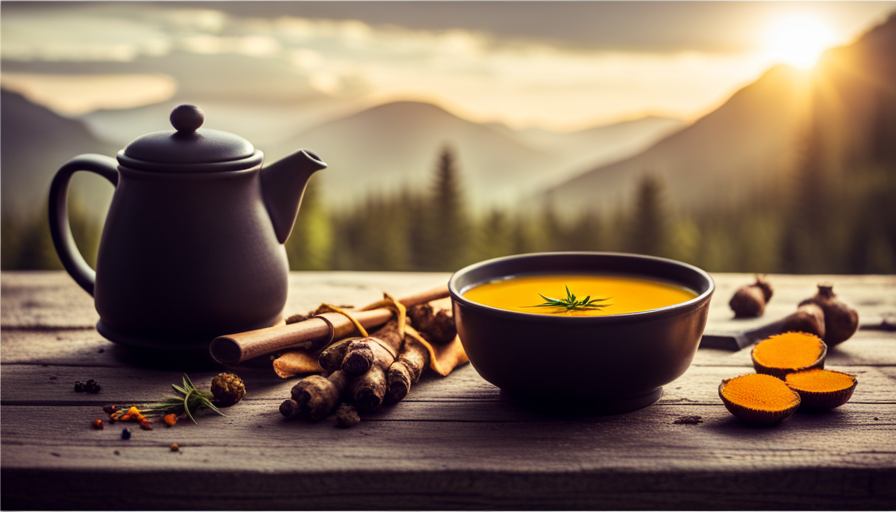I’ve long appreciated turmeric for its health advantages, and I’ve now found an even more effective method of consumption – fermented turmeric tea! This conventional beverage from Okinawa retains all the usual benefits of turmeric while also offering the added bonus of probiotics due to its fermentation.
Making your own fermented turmeric tea is surprisingly easy and can be done with just a few simple ingredients and equipment. In this article, I’ll walk you through the process step-by-step so that you can enjoy this delicious and healthy beverage at home.
So grab your turmeric root and let’s get started!
Key Takeaways
- Fermented turmeric tea contains probiotics that can improve digestion, boost the immune system, and reduce inflammation.
- Making fermented turmeric tea requires fresh turmeric roots, sugar/honey, and other optional ingredients for flavor and health benefits.
- Proper temperature control during fermentation is crucial for balanced flavor and health benefits.
- Fermented turmeric tea should be stored in the fridge to preserve freshness and probiotic benefits, and can be consumed before bed for its calming effects.
Gather Your Ingredients
You’re gonna need to gather a few ingredients if you want to make some delicious fermented turmeric tea that will transport you straight to Okinawa. First and foremost, the quality of your ingredients will be crucial in determining the final flavor of your tea. So, make sure you get fresh turmeric roots from a reliable source. You can also use ginger root for added flavor.
Apart from the roots, you’ll also need water and sugar or honey to ferment your tea. As for the sugar, I prefer using organic raw cane sugar as it gives a unique flavor profile that complements the spiciness of turmeric. However, if you prefer a sweeter taste, you can add honey instead.
Lastly, consider experimenting with different variations of flavors by adding citrus fruits like lemon or lime, herbs like mint or basil, or even spices like cinnamon or pepper. These additions not only enhance the taste but also provide additional health benefits.
Now that we’ve gathered our ingredients, let’s move on to preparing our equipment for brewing!
Prepare Your Equipment
Get your gear ready, starting with a mason jar and a clean cloth to cover it. You’ll also need a funnel, a large mixing bowl, and a fine mesh strainer. Make sure all of your equipment is clean and dry before you start.
Preparing space is also important for making fermented turmeric tea Okinawa. Choose a spot in your kitchen that’s out of direct sunlight and away from any heat sources. This’ll help ensure that the fermentation process happens at the right temperature.
Clear off your counter or table so you have plenty of space to work.
Once you have gathered your equipment and prepared your space, you’re ready to move on to the next step: making the base tea.
Start by boiling water and adding sliced fresh turmeric root. Let this simmer for about 15 minutes until the water turns a deep yellow color.
Then strain out the turmeric pieces and add honey or another sweetener if desired.
Make the Base Tea
After gathering your equipment and preparing your space, it’s time to brew a deep yellow tea by simmering sliced fresh turmeric root in boiling water for about 15 minutes.
For the base tea, you can use different types of tea leaves such as black, green or oolong tea to enhance the flavor and add complexity. I personally prefer using loose leaf black tea for its robust taste that complements the earthy notes of turmeric.
To make a flavorful beverage, you can also experiment with adding different ingredients to the base tea. Some popular choices include ginger, honey or lemon juice which not only enhance the taste but also provide added health benefits.
For instance, adding ginger contributes a spicy kick that helps soothe digestive issues while honey provides an extra boost of sweetness and antioxidants.
Once your base tea is brewed and infused with any additional flavors you desire, it’s time to move on to straining and cooling it before beginning the fermentation process.
By straining out any solids from the liquid, you ensure a smooth consistency for your fermented turmeric tea. Afterward, simply cool down your base tea until it reaches room temperature before moving onto the next step in making this delicious drink.
Strain and Cool the Base Tea
Now that I’ve made the base tea for my fermented turmeric tea Okinawa, it’s time to strain and cool it.
First, I’ll strain the mixture through a fine mesh strainer to remove any large pieces of ginger or other ingredients.
Then, I’ll let it cool down to room temperature before adding the starter culture. It’s important to make sure the tea is completely cooled before adding the culture in order to avoid killing off any beneficial bacteria.
Strain the Tea
Once the turmeric tea has steeped for at least 24 hours, it’s time to strain out the solids and transfer the liquid into a clean container.
Using a strainer will help remove impurities from your fermented turmeric tea, leaving you with a smooth and delicious drink. Make sure to use a fine mesh strainer or cheesecloth to ensure that all the solids are removed.
The longer you strain your turmeric tea, the clearer it will become. If you prefer a stronger flavor, try straining for shorter periods of time.
Once you’re happy with the flavor and consistency of your tea, it’s time to let it cool down before drinking or adding any additional ingredients.
Let it Cool
You’ll want to let your freshly strained turmeric tea cool down before sipping on it or adding any extra flavors. Here are some tips for cooling fermented turmeric tea:
-
Place the tea in a container that allows for good airflow, such as a wide-mouthed mason jar. This will help cool it down faster.
-
Don’t put the hot liquid directly into the fridge – this can cause uneven cooling and affect the fermentation process.
-
To speed up cooling time, you can place the container in a larger bowl filled with ice water.
-
Use a digital thermometer to make sure the temperature is below 85°F (29°C) before adding your kombucha starter.
Temperature control is important in fermentation because it affects how quickly and efficiently bacteria and yeast consume sugars and produce beneficial compounds like probiotics and antioxidants. Properly cooled fermented turmeric tea will result in a balanced flavor profile and potent health benefits.
With your cooled turmeric tea ready, it’s time to add the kombucha starter!
Add the Kombucha Starter
Pour in the kombucha starter to start the fermentation process and promote probiotic proliferation in your turmeric tea. There are different types of kombucha starters available, such as dehydrated, liquid, and vinegar-based. You can also make your own kombucha starter at home by using a SCOBY (symbiotic culture of bacteria and yeast) with some sugar tea.
To help you understand better how important it is to add kombucha starter to your fermented turmeric tea, I have included a table below showing the benefits of probiotics in our health.
| Benefits | Description | Examples |
|---|---|---|
| Improves Digestion | Helps break down food and absorb nutrients efficiently. | Bifidobacterium lactis, Lactobacillus acidophilus |
| Boosts Immune System | Fights off harmful bacteria and viruses that cause illnesses. | Lactococcus lactis, Leuconostoc mesenteroides |
| Reduces Inflammation | Decreases inflammation in the gut and other parts of the body. | Streptococcus thermophilus, Saccharomyces boulardii |
Adding kombucha starter provides an excellent source of these beneficial microorganisms which can potentially improve overall health.
Now that we have added the kombucha starter let’s move on to fermenting our turmeric tea for optimal flavor development!
Ferment the Tea
Now that we’ve added the Kombucha starter, it’s time to let nature do its work and ferment our turmeric tea. The fermentation process can take anywhere from 3 to 10 days depending on the temperature of your environment.
It’s a good idea to taste test your tea every day until you get the desired level of tartness.
During the fermentation process, beneficial bacteria and yeast will consume the sugar in the tea, converting it into probiotics and organic acids. These probiotics can help improve gut health, boost immunity, and reduce inflammation.
Some variations you can try include adding ginger or lemon for added flavor and health benefits.
Once your turmeric tea has reached its desired level of tartness, it’s time to bottle it up! But before we get ahead of ourselves, let’s go over the proper way to bottle fermented drinks in our next section.
Bottle the Tea
Ready to bottle up your deliciously fermented turmeric tea? Bottling fermented drinks may seem daunting, but with the right tips, it can be straightforward.
The first thing to keep in mind is cleanliness. Ensure that your bottles are thoroughly cleaned and sterilized before use. Any residual bacteria or debris could affect the taste of your tea and shorten its shelf life.
When filling each bottle, leave some headspace at the top for carbonation to occur during secondary fermentation. It’s essential to note that if you’re using glass bottles, it’s crucial not to overfill them as they may explode due to pressure build-up from carbonation.
Once filled, seal tightly and store in a dark place at room temperature for a few days until carbonated. The length of time you leave the bottled tea out depends on personal preference; some prefer their tea less carbonated while others like it fizzy.
However, don’t let it sit too long before refrigerating as this can lead to over-fermentation resulting in an unpleasant taste and decrease in shelf life.
Now that we have our bottled fermented turmeric tea ready, let’s move onto the next step – second fermentation!
Second Fermentation
To take your homemade brew to the next level, it’s time to give your bottled tea a chance to ferment once again. This process is called second fermentation and it helps enhance the flavor of your turmeric tea. The first thing you need to do is transfer your bottled tea into a dark and cool place, away from direct sunlight.
During the second fermentation, you can play around with different flavor variations by adding fruits or herbs such as ginger, lemon, or mint. To do this, simply slice up your chosen ingredient(s) and add them into the bottle before sealing it back up. Let it sit for another 1-2 days depending on how strong you want the added flavors to be.
If you encounter any issues during the second fermentation process, don’t worry – there are troubleshooting tips available. For example, if you notice that there’s no fizziness in your tea after 2 days, try adding a little bit of sugar or honey to help activate the yeast. Alternatively, if you notice mold growth on top of your tea, discard it immediately and make sure to sterilize all equipment before starting over.
With all that being said, now that your turmeric tea has undergone its second fermentation process with added flavors (if desired), it’s time to refrigerate and enjoy!
Refrigerate and Enjoy
So, now that my fermented turmeric tea has undergone its second fermentation process, it’s time to refrigerate it and enjoy!
I always make sure to store my jars of fermented tea in the fridge as this helps to preserve their freshness and keep them at just the right temperature.
When I’m ready to drink a glass, I simply pour some over ice or chill it in the fridge for a bit before serving.
It’s such a refreshing and healthy drink that’s perfect for any time of day!
Store in the Fridge
Don’t forget to place your fermented turmeric tea in the fridge to keep it fresh and preserve its probiotic benefits!
Storing fermented turmeric tea is essential for maintaining its flavor, aroma, and nutritional components. Once you’ve finished brewing your tea, allow it to cool down before transferring it into an airtight container. Make sure the container is clean and dry, as any moisture may spoil the tea.
Fermented turmeric tea can last up to two weeks when stored correctly in the fridge. However, if you notice any molds or discoloration on your tea, discard it immediately. It’s better to be safe than sorry when it comes to consuming fermented foods.
Serve chilled for a refreshing beverage that will nourish your body from within.
Serve Chilled
Chilled and ready to sip, you’ll love how refreshing this fermented turmeric tea tastes! Not only does it have a unique flavor profile, but serving it chilled also offers additional benefits. Cold beverages can help lower your body temperature and increase hydration during hot weather. Furthermore, drinking cold tea can potentially aid in digestion by promoting blood flow to the digestive tract.
To enhance the drinking experience of your fermented turmeric tea, consider trying out some serving suggestions. Adding a slice of lemon or lime can add a citrusy kick that complements the earthy taste of turmeric. If you prefer sweeter flavors, try adding honey or agave syrup for a touch of sweetness without overwhelming the natural taste of the tea. And don’t forget about garnishes – mint leaves or a dash of cinnamon can add an extra layer of complexity to your drink.
Moving onto health benefits, consuming fermented turmeric tea on a regular basis may offer various health advantages such as reducing inflammation and boosting immunity.
Health Benefits
Now let’s talk about the health benefits of fermented turmeric tea. I personally love this drink not only because it tastes great, but also because it has some amazing health properties.
First off, fermented turmeric tea is packed with anti-inflammatory properties that can help reduce inflammation in the body. Additionally, it contains probiotics that promote digestive health and antioxidants that benefit overall well-being.
So not only does this beverage taste good, but it’s also good for you!
Anti-Inflammatory Properties
Turmeric’s anti-inflammatory properties make it a great addition to any diet, and what better way to consume it than in a delicious fermented tea? As someone who loves natural remedies and turmeric recipes, I can attest to the benefits of this powerful spice.
Here are four reasons why you should add fermented turmeric tea to your daily routine:
-
Reduces inflammation: Turmeric contains curcumin, which has been shown to reduce inflammation in the body.
-
Boosts immunity: The fermentation process increases the bioavailability of nutrients in turmeric, making it easier for our bodies to absorb and utilize them.
-
Supports digestion: Fermented foods are known for their probiotic content, which can improve gut health and aid in digestion.
-
Promotes relaxation: Turmeric has been found to have calming effects on the body, making fermented turmeric tea a perfect drink before bed.
Incorporating fermented turmeric tea into your diet is just one way to support your overall health. Next up, let’s talk about how probiotics can benefit digestive health.
Probiotics for Digestive Health
If you’re looking for a natural way to improve your digestive health, probiotics may be just what you need. Probiotics are live microorganisms that can benefit our gut by restoring the balance of good bacteria in our digestive system.
The best probiotic supplements contain strains of lactobacillus and bifidobacterium which help with regularity, bloating, and gas. Aside from supplements, fermented foods such as kimchi, sauerkraut, miso soup, kefir yogurt or kombucha tea are also great sources of probiotics.
Fermented foods have been used in traditional diets for centuries due to their numerous health benefits including improved digestion and absorption of nutrients. Incorporating these foods into your diet on a regular basis can support the growth of beneficial bacteria in your gut and promote overall gut health.
By improving your digestive health through probiotics or fermented foods, you’re setting yourself up for better absorption of nutrients from the food you eat–which is key when it comes to antioxidants for overall health!
Antioxidants for Overall Health
You can boost your overall health by incorporating antioxidant-rich foods into your diet, such as blueberries, dark chocolate, and leafy greens. Antioxidants are compounds that help protect our cells from damage caused by free radicals that can accumulate in the body due to environmental factors like pollution, stress, and unhealthy food choices. In addition to consuming antioxidant-rich foods, you may also consider taking supplements to ensure you’re getting enough of these important nutrients.
To give you an idea of which foods are high in antioxidants, take a look at this table:
| Food Source | Antioxidant Content |
|---|---|
| Blueberries | High |
| Dark Chocolate | High |
| Spinach | Moderate |
| Kale | Moderate |
| Almonds | Moderate |
When free radicals accumulate in the body faster than they can be neutralized by antioxidants, it leads to a state called oxidative stress. This can damage cells and contribute to chronic diseases like cancer, heart disease, and Alzheimer’s. By incorporating more antioxidant-rich foods into your diet or taking supplements as needed, you can help prevent oxidative stress and promote overall health and wellbeing.
Frequently Asked Questions
What is the difference between fermented and non-fermented turmeric tea?
Fermented turmeric tea is different from non-fermented turmeric tea. It undergoes a process of fermentation, which creates beneficial probiotics and enzymes. Fermenting the turmeric also enhances its bioavailability, making it easier for our bodies to absorb and utilize its nutrients.
In terms of health benefits, fermented turmeric tea has been shown to have anti-inflammatory properties that can help reduce pain and inflammation in the body. It may also boost immune function and improve digestion.
Non-fermented turmeric tea still offers many health benefits, but fermenting the turmeric takes those benefits to another level. Incorporating fermented foods and beverages like fermented turmeric tea into your diet can be a great way to support overall health and wellness.
Can I use a different type of tea as a base for the recipe?
When it comes to making fermented turmeric tea, there are a variety of alternative tea bases you could use instead of the traditional green or black tea. For instance, I’ve experimented with using white tea and even herbal teas like chamomile or peppermint as a base.
Each alternative base will yield its own distinct flavor variation, so feel free to get creative! Just keep in mind that certain teas may not ferment as well as others, so you might have to experiment a bit to find the perfect combination.
Ultimately, the beauty of making your own fermented turmeric tea is being able to tailor it exactly to your taste preferences.
How long does the fermentation process typically take?
Fermentation duration can vary depending on the recipe and environmental factors such as temperature, but for fermented turmeric tea, it generally takes around 2-3 days.
During this time, the natural bacteria present in the tea leaves or added starter culture will consume the sugar and produce beneficial compounds like probiotics and antioxidants through fermentation. The benefits of fermentation are numerous – not only does it increase the nutritional value of the tea by making certain nutrients more bioavailable, but it also improves digestion, boosts immunity, and may even have anti-inflammatory effects.
It’s important to monitor the fermentation process closely to prevent over-fermentation or spoilage and ensure that you achieve your desired level of flavor and health benefits.
Can I use a different type of starter instead of kombucha?
When it comes to making fermented turmeric tea, there are several alternative starters that you can use instead of kombucha.
One option is using water kefir grains, which add a slightly tangy and effervescent flavor to the tea.
Another option is using a ginger bug, made from fermenting fresh ginger with sugar and water. This adds a spicy kick to the tea.
Experimenting with different starters can lead to unique flavor variations in your turmeric tea. Whether you choose kombucha or an alternative starter, the fermentation process typically takes anywhere from 24-72 hours depending on the temperature and desired level of fermentation.
How long can the fermented tea be stored in the refrigerator before it goes bad?
Did you know that fermented foods and drinks have been around for thousands of years? In fact, the ancient Greeks and Romans used fermentation to preserve their food.
Now, when it comes to storing fermented turmeric tea, there are a few things to keep in mind. First off, it’s important to store the tea in an airtight container in the refrigerator. This will help slow down any further fermentation that may occur.
As for shelf life, typically fermented turmeric tea can be stored for up to 2-3 weeks in the fridge before it goes bad. However, this can vary depending on factors such as temperature and how well-sealed your container is. So be sure to check for any signs of spoilage like mold or an off smell before consuming your delicious home-brewed tea!
Conclusion
In conclusion, making fermented turmeric tea isn’t just delicious but also great for your health. It’s like a party in your mouth with every sip!
The combination of the earthy and spicy flavors will transport you to the beautiful island of Okinawa. Not only does this drink taste amazing, but it also has numerous health benefits.
It can reduce inflammation, boost digestion, and promote overall wellness. So why not give it a try? Gather your ingredients, prepare your equipment, and follow these simple steps to make your own batch of fermented turmeric tea.
Your taste buds (and body) will thank you!










